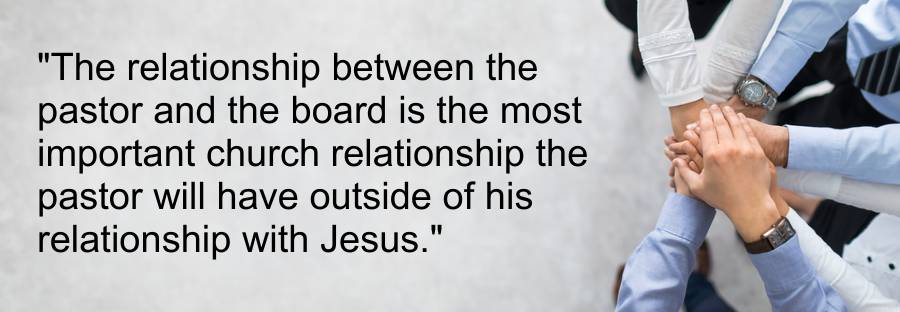In the realm of church leadership, trust is the pillar upon which healthy and thriving relationships are built. But it is not something that can be achieved overnight; trust is forged over time through a deliberate process.
In this article adapted from Converge’s Church Board Development training series, Larry Adams, a seasoned church leader and a Converge PacWest mentor and coach, shares his insights on nurturing this vital connection and the key elements of establishing and maintaining trust within the crucial pastor-board relationship.
The importance of relationships in the church
38 years ago, my wife, Carla, and I had the privilege of being a part of a church plant in Antioch, California. By God’s grace, over the years, the church plant grew into a church of more than 4000 people. Along the way, at every stage of the development of that church, whether it was a church plant or what someone would call a megachurch, I saw the importance of the relationship between the pastor, the staff and the church board.
I’d be willing to say, in my opinion, that the relationship between the pastor and the board is the most important church relationship the pastor will have outside of his relationship with Jesus. His marital relationship is important and his family relationships and friendships are important, but in the church, the relationship between the pastor and the board is one of the most important he’ll ever cultivate.
Building trust in the pastor-church board relationship
Trust is essential to having that kind of relationship — and trust is something that has to be forged over time. In fact, when Jesus talked about trust the night before he went to the cross, he told his disciples, “You trust in God. Trust also in me.”
The word he was using about this trust was a form of the word that means to have conviction. A deep faith. A trust in God. A trust in one another. In other words, you are assured that what you’re seeing is the real deal.
When it comes to board and pastor relationships, that kind of trust is an essential quality. But it has to be developed over time.
That’s why today in my role in church strengthening, one of the things I talk to pastors and their boards about is how you foster this kind of trust on a board level. One of the things that we learned over time is that you first must have a process where board potential board members can be identified, where they can be assessed and where they can be trained.
Fostering trust on a board level
There are many ways to find resources to help you with identification and assessment. But we’re talking about more than just having a board that’s plugging holes or filling things in from a nominating committee.
Trust is crucial to this process, but remember, it has to be forged over time. And so you develop a process where you help identify people in your church you believe are capable of being called by God that this elder role. Once they are identified, there has to be a time of assessment — a place where they can come and you can evaluate them according to the calling that may be upon their life.

There are more than 20 essential attributes of an overseer, deacon or elder listed In I Timothy 3, Titus 1 and I Peter 5. Those qualities all have to do with their faith in God, their trust in the Lord, their prayer life, how they manage their families, their reputation with outsiders and their passion and concern for the church that they’re called to oversee. They were to be undershepherds of the great shepherd Jesus.
So, part of your board member assessment has to be done over time to allow you to evaluate these people according to the qualities outlined in the Scriptures referenced above.
During my time as pastor, I would tell the board, “I am one of the elders, but I want to be fully submitted to you. But I can’t fully submit myself to men unless I know they are trustworthy, are people who are walking with God, are people of deep faith and prayer who are invested in giving and serving, and are people who care deeply about the church, Christ and the kingdom.
“Because later when you tell me no or yes on something or that the vision and direction we’re headed is the right one, I will have greater confidence and trust that you have borne those things out before God and that what you are speaking is his very word. And you can have that same trust in me.”
The congregation’s need for trust
That kind of trust is essential — not only to the pastor and board but also with the congregation. The congregation needs to know that the people who are over them as their undershepherds are trustworthy and have been proven.
In fact, in Titus 2, Paul was talking to Titus about how to form these elders on the island of Crete. When he came to all the different categories — older men, younger men, older women, younger women — he came to the subject of slaves. Paul said the slaves must be proven that they can be trusted so that the teaching about God our Savior will be attractive.
In people’s minds, there’s always a connection between whether people are proven in leadership and whether or not they can be trusted. That is why there needs to be an assessment process.
Once that assessment has been made, there needs to be a time for training when these elders are brought in with the other elders to see what they do, how they pray, how they minister in the church and what it really means to be a shepherd. They need to be taught and trained over time. During that process, you learn to foster trust.
Maintaining an ongoing trust
Once a process has been established and elders have been identified, there has to be an ongoing maintenance of that trust. That’s why an elder board needs to spend much time in the Word together and praying together, seeing how they wrestle with real issues of life that are going on in their lives, their marriages and their families.
As they pray for one another they carry together the burdens of the church and intercede for those over whom they’ve been placed as under shepherds. It’s amazing to witness the kind of trust, assurance and faith in one another that is developed as they do this regularly.
At my former church, the elder board held four meetings each month. Two of those were meetings where we did business. But even in those meetings, we’d spend a half hour to an hour praying together about all the things that were going on in our lives and what we were about to discuss on our agenda. Every other week, we would spend the entire evening together in prayer and sharing about what was going on in our lives.
If there is going to be a healthy relationship between the pastor and the board, trust is essential. How your elders are chosen, assessed and trained and however or how often they meet and what they do in those meetings will all either contribute to or not provide for an avenue to develop trust.
In the everyday ministry of the great events that we all face — especially in the church’s crisis moments — it is essential that the congregation, the board and the staff have a common trust and that they know they can look to God, that God will lead them and the outcomes that God leads them to can be fully trusted by those with whom they are following and leading.
This post is based on a video message from Larry Adams, a longtime pastor who serves as a Converge PacWest mentor and coach. As of October 2023 (when this article was published) the message is one of 24 video discussions included in Church Board Development training (with 12 more to be published soon), free to all Converge churches and available to churches outside of Converge for a small fee. So far, approximately 180 churches have incorporated Church Board Development training into their board meetings. Learn more about investing in your board and strengthening your church through Church Board Development.



